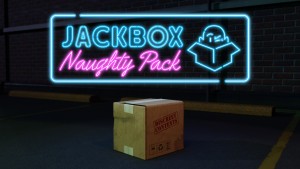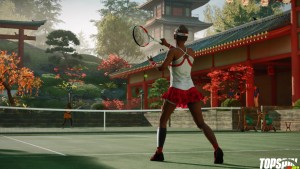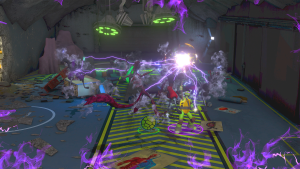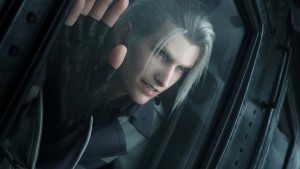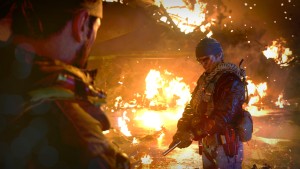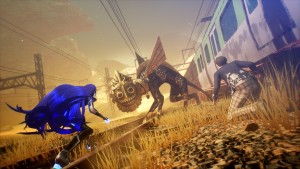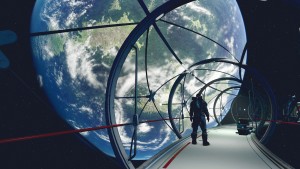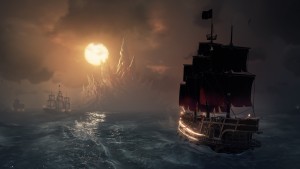Please support Game Informer. Print magazine subscriptions are less than $2 per issue
Afterwords – Alien: Isolation

Alien is an illustrious film series with a less impressive track record in video games. Eschewing the action-oriented approach most developers take with the series, The Creative Assembly honed in on the tense, claustrophobic atmosphere of the original 1979 hit for Alien: Isolation. We spoke with Alien: Isolation director Alistair Hope about game's distinct pace, fan reception, creating Amanda Ripley, and much more.
The last game based
on the franchise, Aliens: Colonial Marines, was skewered by critics and fans
alike. Did that reception put any added pressure on you or affect your approach
to the series?
The vision for the game was really clear from the start.
We wanted you to experience what it would be like to encounter and survive
against Ridley Scott's original Alien; to make a game about survival and not
about killing. So it was clear from the start we wanted to take Alien games in
a completely different direction to any that had come before. We've been
working on this game for about four years and obviously we were aware of the
development and subsequent release of Colonial Marines. After the game came
out, we saw a lot of people asking for a scary Alien game, a game where just
one Alien could be a challenge...and that was exactly what we were making; that
was massively reassuring. From a creative point of view we knew what we wanted
to make and that didn't change at any point during development.
Alien: Isolation presents
players with a very specific and atypical gameplay experience compared to other
first-person games and survival horror games. Was there ever a desire to make
the gameplay more accommodating in hopes of appealing to a larger player base?
Games based in the Alien universe had previously been
inspired by the James Cameron experience: one of pulse rifles, marines, and many
Aliens. It felt like nobody had tapped into the original movie, where one Alien
could pose a significant threat to the player. We wanted to create a new Alien game
experience, based on the core values of the first film. To make a new,
definitive survival horror based on the original survival horror. What was
interesting was that whenever we were in a position to show anyone what we were
doing, and for many years we weren't able to tell anyone what we were making,
they became really excited and wanted more, so it felt, from the start, like
there was an audience out there hungry for something new.
Reception to the game
also seems polarized; either the gameplay clicks and people love it, or they
find it too slow or frustrating. What were your hopes going into launch, and
has critical and fan reception lived up to your expectations?
I think creating a new experience is inherently risky but
that's why we make the games we make; to create new experiences. We're hugely
excited by the sheer volume of articles and commentary that have been
fantastically positive. It's humbling to see how strong those responses have
been in support of what we've made and perhaps that's a sign that we've
actually created something which has moved the genre forward.

The save system has
been criticized for sometimes causing players to replay long segments after
dying. What do you think the benefits are to this system compared to strictly
having checkpoints or a more traditional manual save system? Would you make any
changes in hindsight?
For me, a core component of horror is in "small victories," small achievements that allow the player to breath again. Tiny events or
moments where, if the player just manages to keep doing what they're doing they
might just ultimately make it out alive. We discussed a number of save options early
in development but we kept coming back to the manual save points as it really
supported the horror, which is fantastic. An element we usually take for
granted is actually key to the experience. Saving becomes part of the fabric of
the horror. If you pushed me, I'd probably have to say, in hindsight that
perhaps some of the save point locations could be seen to be a little challenging,
but having said that, has saving ever felt so sweet?
What do you think are
the main personality traits of Amanda Ripley, and how did you try to capture
them in her portrayal and performance?
In Amanda we had this really amazing character to
explore. She is Ellen Ripley's daughter, so she had the potential to exhibit some
of the same characteristics as her mother – she shares the same DNA, but at the same time has her own personality.
She is a character who has been searching for answers as to her mother's
disappearance her whole life and when Weyland-Yutani invite her to join the crew
being sent to retrieve the Nostromo flight recorder she finally has the
opportunity to "close the book." Of course, events mean that things don't work
out as planned and she gets to confront the horror that separated her from her
mother in the first place. I think Amanda goes on her own journey and she
changes as the world around her, and those around her, influence her decisions.
She embarks on the mission for very personal, even understandably selfish
reasons and ends the story prepared to sacrifice herself to save others.
Ellen Ripley is one
of the most iconic characters in the horror genre. How did you balance
capturing some of her traits in Amanda, while not making her seem like a carbon
copy of her mother?
Absolutely right. Ellen Ripley is the heart of Alien, she
is a totally unique, iconic, and pioneering character and we wanted Amanda to
mirror some of the same traits. I think one of Ellen's main characteristics is
her clarity of thought under pressure combined with her incredible ability to
keep pushing to survive against all odds. To keep making the right decisions,
to keep fighting to survive. Whereas the rest of the Nostromo crew could be
said to die by their flaws, Ellen's "flaw" – her focus and discipline turns out
to be what saves her. Amanda has many of the same traits but is her own
character, her own personality. I think we wanted to push them further. For
example, she starts out a little more cold than her mother, she doesn't hide
her anger at the Company. At the same time, her strength of character also
shows through, the determination and the focus to get answers.
Coming Up Next: We discuss in-game callbacks to the original film, criticisms over the length of the campaign, and how the xenomorph thinks for itself...

I enjoyed the
numerous callbacks to the Alien films and playing through some iconic moments
inspired by the movies, but as a result some of the plot points are predictable
for Alien fans. How do you balance fan expectations with creating a new and
original experience?
We always knew we had potentially two audiences. The
first was the audience with a deep knowledge of the universe and who had seen
the films, in particular the original Alien. We wanted to give that audience
the opportunity to return to the roots of the series and for the first time to
really return to Ridley Scott's haunted house in space and experience what it
would be like to encounter and survive against the original Alien. The other
audience would be those who were coming to the universe completely fresh, where
Alien: Isolation would represent their introduction to this unique franchise.
So we wanted to include elements that were distinctly signature and at the same
time expand the world, bringing new components into play. For example, the game
takes place in a completely new location overseen by Seegson, a wholly new
company. This really helped us move away from everything in the story being
Weyland-Yutani and introduce new characters and themes.
The camera is
positioned a lot higher than in most first-person games. Even though the
perspective is more realistic, some players find it distracting. What factors
went into this decision?
As like many of the elements in the game, we took our
cues from the original movie which has this really great pressure-cooker feel
as the crew inhabits the claustrophobic environment of the Nostromo. The
original set is famous for being physically built for the actors to move around
inside and many of our environment metrics were taken directly from the
production archive material Fox provided at the start of development. So to
answer your question, the height of our sets is quite low to help give this
claustrophobic feeling. Amanda isn't particularly tall but she, like the rest
of the cast are inside this man-made, believable (if slightly uncomfortable)
feeling environment, which again all feeds into the horror.
The biggest criticism
lodged at the game is the length; most reviewers felt it was too long. Do you
think the game would've been more potent as a shorter experience? Have you
heard the same criticisms from players?
We give the player as much choice as possible, and how
quickly a player progresses through the world is down to their skill and the
choices they make. We wanted players to feel like they had been on a journey
and had overcome and survived the sustained threat of being underpowered and
underprepared to confront the obstacles being thrown at them. Interestingly
when we originally announced at the beginning of 2014, the speculation we saw
was that the game could only possibly last a few hours!

You also visit
several locations more than once, which I think compounded the criticisms about
the game's length. Why did you decide to have players return to areas they
already explored?
We wanted the player to feel like Sevastopol was a real
place and returning to areas again, sometimes including new or expanded
sections of previously visited locations, helps provide the sense that this was
a believable world where areas reconnected with familiar or previously explored
locations. Often these areas have changed as a result of the story so they're
still engaging upon the player's return.
What were the goals
and priorities when developing the xenomorph's A.I.?
From the outset, we wanted to re-Alien the Alien. To make
a game where encountering just one Alien creature could be scary and offer a
new meaningful interaction to the player. We wanted to restore the Alien as the
ultimate killer and a creature that commanded the player's respect. But we
realized early on that in order to achieve our goal we could not script or
control the Alien's behavior. If the player knew what the Alien was going to do
then any fear would be lost and the tension would evaporate. So we took a
completely new approach whereby the Alien would use its senses to track the
player down. So the Alien is looking and listening for the player. This makes
the creature dynamic and reactive as it responds to the player's actions and
the world around it. This also means that no two playthroughs are the same, which for me is the magic of the game. It's very much a single-player
experience, but even though all players start in the same place – and hopefully
survive to end in the same place – the journey they have is unique to them.
This also makes it hugely entertaining to watch as well as play. When we took
the game to San Diego Comic Con we had a large crowd, all day, every day,
simply watching players trying to survive against the Alien. They would stand,
or even sit, in the middle of the convention show floor for 30-40 minutes
watching on a large screen as new players, every three minutes, would try and
survive against the Alien. Same map, same Alien, but each player's attempt was
different and entertaining to watch. It felt like we had created something
really special.
Do you see Alien:
Isolation as a one-off game? Or would you like to turn it into a series?
We said it when we announced the game. Alien: Isolation
is the Alien game we've always wanted to play and I think we've demonstrated the
team's deep passion and commitment to delivering a new type of Alien game
experience. I also like to think, if you've beaten the game, that there are
still some questions left unanswered...
For more on Alien: Isolation, read our review, gameplay tips, and DLC impressions. Make sure to also check out our bonus coverage from Game Informer's recent Horror Issue.


